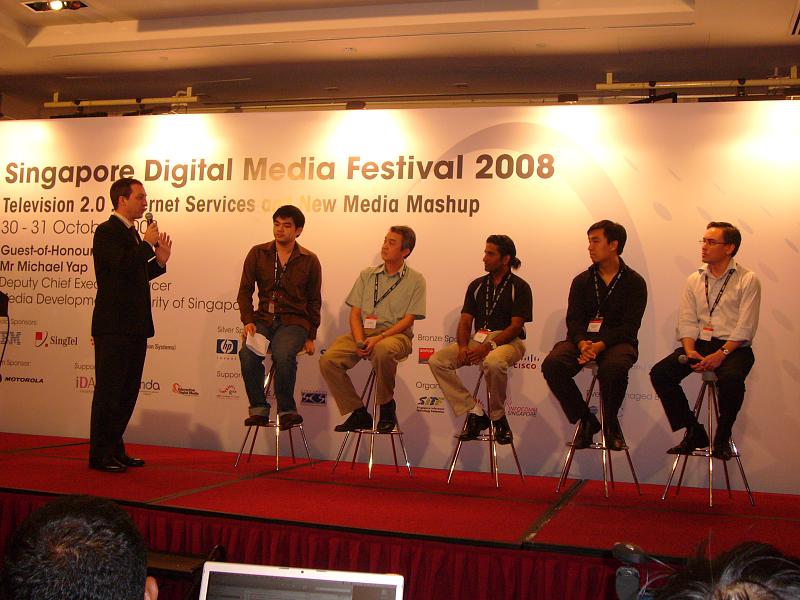
Panel discussion on Web 2.0 and Building Online Communities moderated by Mark Laudi
At the invitation of Text 100 and the Singapore IT Federation, I had the privilege of attending the recent Singapore Digital Media Festival 2008 Television 2.0: Internet Services & New Media Mashup.
Together with me were other bloggers and podcasters like Shunjie, Pat Law, Claudia, Bernard, Darryl, Daniel, Coleman, Clapping Trees, Preetam, Howie (from The Digital Movement), Andrew Peters, Shalabh, the Tech65 crew, and a few others.
The two day programme started with Festival Film Screenings at the Gallery Theatre of the National Museum of Singapore on 30 October, which featured User Generated Content (UGC) and movies created by different approaches. These include open source, machinima, live broadcast, indie, and “Sanctuary” films. A special screening of the famous Star Wreck and Iron Sky films were also done.
Held at the Legends Fort Canning Park, the second day of the programme (31 Oct) was a conference cum exhibitor showcase focused on the latest industry developments in digital media production, hardware and technology. It featured prominent industry leaders in the field of digital media production like Iolo Jones, founder of Narrowstep, Hugh Hancock, founder of Strange Company and the creator of Machinima.com, and Timo Vuorensola, director of the Star Wreck and Iron Sky movies.
Due to time constraints and an overactive schedule, I wasn’t able to attend all the sessions. However, I did gain some insights on the digital media production scene as follows:
UGC – More a Hobby Than a Job?
Unless you are as talented as the the thought leaders of internet movie making above, the likelihood of making any income from short online films is slim. The business model appears to be more advertising (google ads, banners, sponsored content) as opposed to a pay-per-view or subscription-based model. Even then, only the very best in the business will stand a chance to be commissioned, which is why only mrbrown seem to be the only full-time podcaster who is commercially viable in our social media spaces.
Utility and Interactivity May be the Answer
People do not want to pay for comedies that they can view for free on Youtube, but they are willing to pay a buck or two for music or movies that they can use on their iPods. This is why AppleTV and iTunes are still turning in decent profits year after year despite the plethora of free content on the net. It is also another reason why folks are willing to pay money for online gaming where both interactivity and entertainment abound.
Youths are Highly Net Savvy but Hardly Profitable
As a segment, youths probably reflect the greatest potential for social media content providers as they spend many waking hours online. However, their lack of funds and credit cards makes them poor paymasters and this could present a problem. One solution is to offer micropayments like the case of China’s QQ (which incidentally look like a web designer’s nightmare but yet attract hordes of visitors).
Singapore’s Dilemma – Hardware Rich, Content Poor
We had a good debate on this issue together with Iolo, Hugh and Timo just before lunch. While Singapore does have some of the latest state-of-the-art digital production equipment, hardware, software, and pipes (both terrestrial and mobile broadband), we have hardly any award winning productions. While there are amateur producers here creating their own short movies, music, or video games, most do not have the wherewithal to garner a global audience. The irony is that we are probably one of the greatest consumers (by proportion) of online movies and content in this part of the world.
Mainstream Media Participation
Both MediaCorp and SPH have muscled their way into the digital production and social networking space, by offering content that can be downloaded and shared online as well as social media platforms. These come in the form of numerous web properties like Blogtv, Omy.sg, STOMP, RazorTV, podcast.sg, mocca, and others. While the net channels employed are pretty comprehensive and far reaching, the substance of their content seems pretty much similar to what they are already doing. You can still experience the same production values, scripting, presentation styles, acting and animation.
Mentorship for Local Media Wannabes?
One suggestion that was floated to solve the dearth of digital media talent is to introduce a mentorship programme. Geek gods in the animation and movie universe could offer a guiding hand to our young talents and students, teaching them the basics of scripting, camera angles, production values, editing, effects, and other disciplines in broadcast production. They could also help to bridge the gap between the techies (folks who are into gadgets and gizmos) and the creatives (folks who thrive in the world of art, imagination and dreams). Perhaps by inspiring folks from both sides to work together, a better future could be forged for our growing digital media universe?
